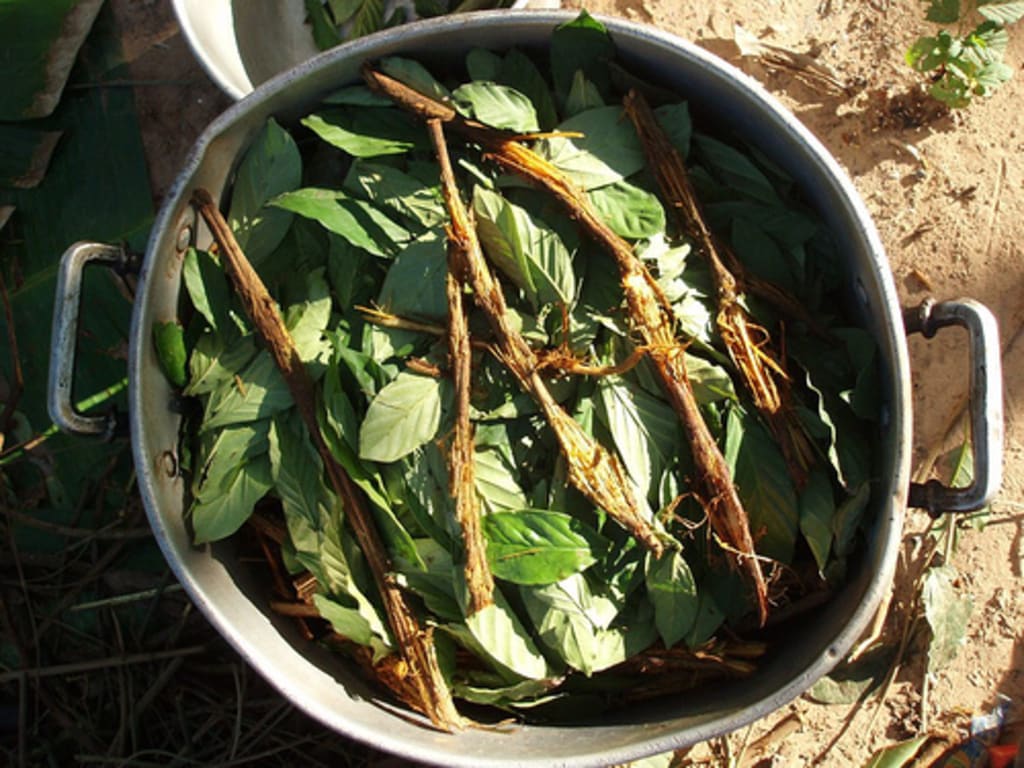The Healing Power of Ayahuasca
How traditional plant-based medicine can help with trauma

When I first heard of ayahuasca, I was skeptical. How was a hallucinogen going to be helpful in treating mental illness?
Still, I thought it was worth doing some looking into, especially since a big proponent of the therapy is Dr. Gabor Maté, who I'm familiar with through his book In the Realm of Hungry Ghosts. He advocates for its use in treating trauma and addictions.
A good starting point to learn about the therapeutic uses of ayahuasca is the documentary The Jungle Prescription. This episode of the Nature of Things, narrated by well-known Canadian scientist Dr. David Suzuki, is embedded below. There's also some useful information in Dr. Maté's interview with The Smart Couple's Jayson Gaddis.
What Ayahuasca Is
Ayahuasca is a plant-based traditional medicine used by at least 70 different tribes in the Amazon Basin. Several plant components are boiled for several hours and then reduced in volume to make a tea. There are several active ingredients, and the ingredient in the leaves of psychotria viridis only becomes activated when mixed with active ingredients found in the Banisteriopsis caapi vine. Some of these ingredients act as monoamine oxidase inhibitors (MAOIs), and have the same activity as the MAOI class of antidepressants on the neurotransmitters serotonin, norepinephrine, and dopamine.
Consumption of ayahuasca leads to an intent, dream-like hallucinogenic state that is thought to allow repressed memories and emotions to be released, producing a sense of catharsis. With the appropriate guidance, this can facilitate processing of trauma-related memories and uncover the root causes fo addictions.
Ayahuasca can also cause nausea and vomiting. In traditional use this may be viewed as a sign of purging negative energy.
Much of the scientific research into ayahuasca has been conducted at the Sant Pau Institute of Biomedical Research, based in Barcelona, Spain. Ayahuasca does not appear to be addictive. It can activate certain regions of the brain, and it's thought that this can allow for new neural connections to be formed based on a reevaluation of the trauma-related memories.
How Ayahuasca Is Used
The Jungle Prescription documentary looks at ayahuasca use at the Takiwasi Center, a Peruvian addiction treatment program. The Center's staff includes a mix of Western medicine practitioners and traditional local shamanic healers. The Center produces some impressive results, with 60 percent of participants remaining clean at the three-year-point after completing the treatment.
In the Amazon, use of ayahuasca is performed as a shamanic healing ritual. Often these shamans have undergone their own healing experiences, facilitated by the plant. The shamans aid participants in setting intentions for the ritual, and interpreting the memories and emotions that arise throughout the ritual.
The healing approach is spiritual, holistic, and community-oriented. The use of ayahuasca can facilitate insights in a more rapid way than other strategies, and allow participants to expand their awareness. The guidance of a healer is important in this, and Dr. Maté cautions that use of the plant on its own is unlikely to yield the benefits that come from participation in the entire traditional ritual. The ayahuasca is less a treatment and more a facilitator.
Dr. Maté takes the stance that while this approach to treatment has great potential, it's not necessarily right for everyone, and it's not always better than more conventional treatment approaches. This awareness of potential limitations is actually reassuring, as it demonstrates application of critical thought rather than jumping on a bandwagon.
This sounds like a treatment that, when done carefully, can have some positive effects for treating trauma and trauma-related conditions. However, it seems clear that therapeutic guidance is required to be able to achieve therapeutic benefit from the opened-up state that ayahuasca induces.
Episode of the CBC documentary program The Nature of Things focusing on ayahuasca and featuring Dr. Gabor Maté.
Jayson Gaddis interviews Dr. Gabor Maté on The Smart Couple
About the Creator
Ashley L. Peterson
Mental health blogger | Former MH nurse | Living with depression | Author of 4 books: A Brief History of Stigma, Managing the Depression Puzzle, Making Sense of Psychiatric Diagnosis, and Psych Meds Made Simple | Proud stigma warrior






Comments
There are no comments for this story
Be the first to respond and start the conversation.